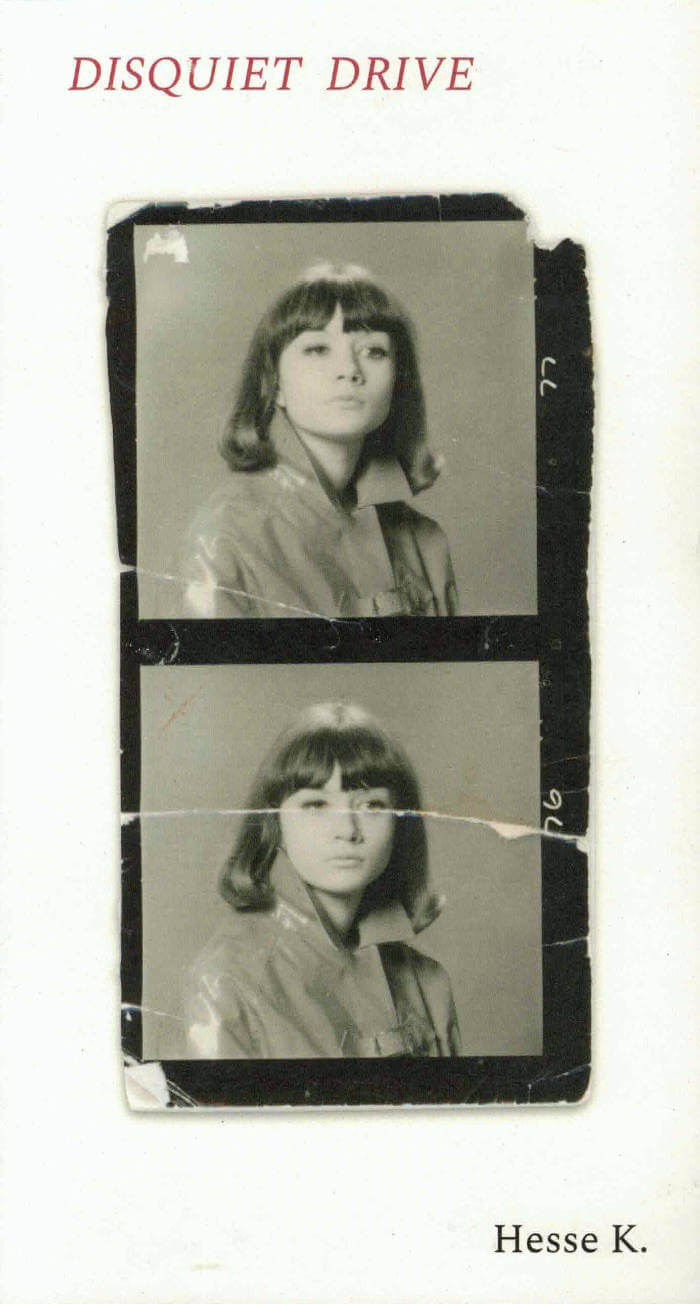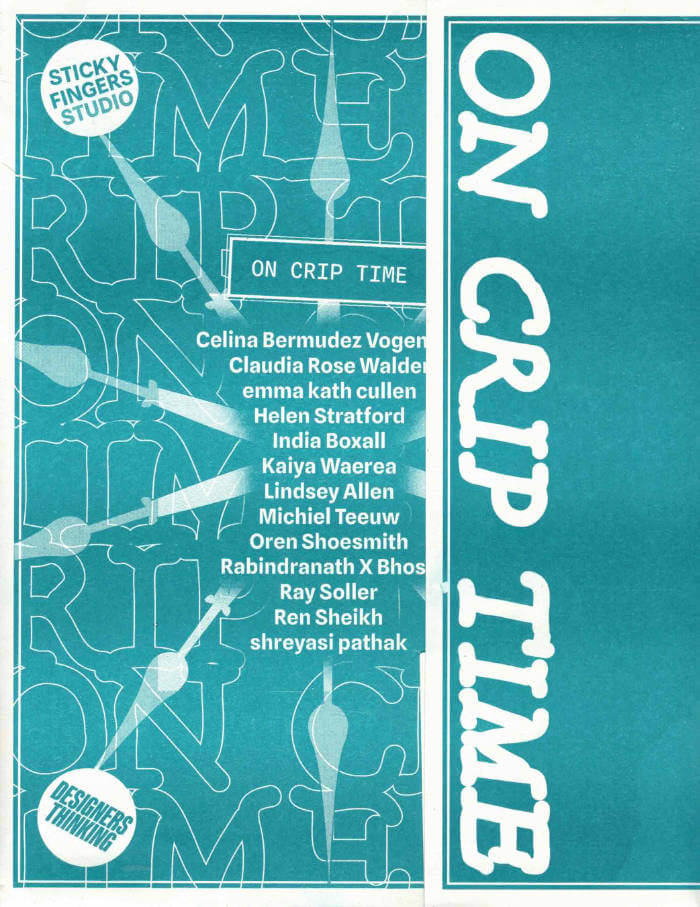Sticky Fingers
Sticky Fingers

Fortune Teller
Sticky Fingers' Fortune Teller features wisdom from McKenzie Wark, Octavia E. Butler, Kate Zambreno, bell hooks, Clarice Lispector, Eileen Myles, Kathy Acker, Johanna Hedva, Lou Sullivan, Audre Lorde, June Jordan, and Anne Boyer.
A3, single colour risograph

Masturbatory Reader (2nd edition)
This Masturbatory Reader asks three main questions.
1. What power and pleasure can we access through attending to the erotics of knowledge production?
2. How are the sites, systems and tools of knowledge-making designed to reiterate violent norms (and in turn, erase deviant practices)?
3. What could the making (and unmaking) of these systems allow us to imagine?
To unpack these questions the edition gathers 16 contributors across 136 pages, conjuring the thinking (wondering, studying, lusting, sweating, ranting) of an expanding chorus of references that sit distances apart, folded here between facing pages. A chorus calling to action, calling to theory, calling to bed.
Featuring D Mortimer, Wes Knowler, Biogal, Tallulah Griffith, Brooke Palmieri, Carl Gent, Sophie Mak-Schram, Alice Butler, Jessa Mockridge, Nat Pyper, Alton Melvar M Dapanas, Sammy Paloma, Donna Marcus Duke, and Ryan Boultbee, with a forward by Emily Pope.
“In this anthology, reading is cruising, and cruising is reading.” – Sam Moore, ‘The (Bad) Taste Test: Radical Acts of Queer (Self) Pleasure in The Masturbatory Reader’, Polyester Zine
.jpg)

And more

Disquiet Drive
One night a satellite falls out of the sky and splits a girl in half. Disquiet Drive is a book scraped together from the shorn parts of a person who may no longer exist. Beginning with an admission that language and embodiment seem indistinguishable, yet refusing to claim a singular voice, the texts in this collection lurch between the fiery crucible of a transition and the weird jaggedness of our own continuity; between inverted memoir and prose-poetry; the raw, irrepressible lyric and the essay as an exercise in the art of digging-one’s-heels-in. Disquiet Drive is about undoing the words we’re handed so that language can survive, and undoing the body so that it can find a way to live.
'Disquiet Drive is restlessly exquisite. Hesse K’s writing vibrates with the quiet solar intensity of a planetary body that can’t be looked at directly: things slip, slink, snick and lick into each other, limning a gorgeous periphery where genre, past and future selves, follies, fossils and hormones collide. I can’t remember when I last read something as exhilarating, beautiful and deeply attuned to the implications and contradictions involved in struggling towards a bearable world, and the ‘undomesticated sensibility’ it requires of us.' — Daisy Lafarge, author of Lovebug
'Buck wild and entirely unique, Disquiet Drive took me to the beautiful and chaotic edge of the universe and made me want to write (live) for 200 years.' — Eliot Duncan, author of Ponyboy
Hesse K. is a writer. Her criticism and poetry has appeared in MAP magazine and Montez Radio, and in anthologies by Sticky Fingers Publishing, Toothgrinder, Worms and Pilot Press, among others. She lives in London.

On Crip Time
This publication brings together works produced during the ‘Woke Designers Reading Club: Designing on Crip Time’ programme devised by Kaiya Waerea and Michiel Teeuw in Autumn 2022. Here we gathered to read, watch, listen and write through questions orbiting around how systems of time are enforced to prevent disabled people from accessing the future.
In this publication, you will find a range of unruly resistances. From flowcharts of lives lived and unliveable, to prayer mats, to posters, to diagrams cartographing time, to manifestos for being in a world that is built to erase us.
Designed by converger / Michiel Teeuw
Printed and finished by Sticky Fingers Studio
Featuring Celina Bermudez Vogensen, Claudia Rose Walder, emma kath cullen, Helen Stratford, India Boxall, Lindsey Allen, Michiel Teeuw, Oren Shoesmith, Rabindranath X Bhose, Ray Soller, Ren Sheikh & shreyasi pathak, with an introduction by Kaiya Waerea.
23x18cm finished size, includes an A5 24pp pamphlet, 6 A3 unbound sheets & 1 A3 wrap cover, risograph printed throughout

Chesil Cliff House and other failures
Orbiting around the saddest house in the history of Grand Designs, Sam Moore’s Chesil Cliff House and other failures takes us to North Devon where, standing at the cliff’s edge, we meet Edward Short: a man with a Fred Perry shirt and a dream. Amongst a chorus of characters including Kevin Mcloud as Father Time, Moore by means of Short leads us into a study of creative failure, gender, and, ultimately, the desire to keep writing.
"I struggle to see anyone living here. It feels like a distorted wonder of the world, a cautionary tale. Something that could never have been lived in, but that had to be made."
About the author:
Sam is a writer, artist, and editor. They are the author of All my teachers died of AIDS (Pilot Press), Long live the new flesh (Polari Press), and Search history (Queer Street Press). They are one of the co-curators of TISSUE, a trans reading and publishing initiative based in London.
About A Series of Attempts:
This new series published by Sticky Fingers Publishing explores the essay form through the etymological root of essay: to try, trial or attempt. In 1508, French theorist Michel de Montaigne published a collection of 107 texts called Essais, described by his contemporaries as ‘self-indulgent and embarrassingly confessional.’ It is through these roots we find the attitude and intentions at the heart of this series; that through thinking together, through trying to figure it out on the page, we can reach new and increasingly nuanced ways to understand each other and the worlds we inhabit.

I love you forever is murder
Here, in a work of trans pessimism, amy etherington asks what love and grief mean in a world that wants you dead. Speaking to a structural, architectural violence, I love you forever is murder imagines transness as an exit, which then implies a reentry. Understanding love and grief as inextricably entangled, etherington examines how trans people are often met with grief by those who claim they love them.
Part break-up text, part grief-oriented trans theory, part whispering, pricking, ghostly presence-from-beyond-the-grave, etherington calls upon Lacan through Edelman, Freud, Derrida, and the voices of friends, writing with an aching warmth and confessional intimacy that seeks to live, write, go on, after your own passing.
About the Author
amy etherington is an educator–researcher–writer, exploring grief, death and transness and how they sit by the edges of things. Her writing feels through/with a pessimism that there might only be no place for transexuals in this World, itself an imagining wrought from our violent unmaking. Her teaching work seeks ways to resist the institution a little longer from within its grounds, through collaborative investigation of care and caring practices with students. @amy.ether
About a Series of Attempts:
This new series published by Sticky Fingers Publishing explores the essay form through the etymological root of essay: to try, trial or attempt. In 1508, French theorist Michel de Montaigne published a collection of 107 texts called Essais, described by his contemporaries as ‘self-indulgent and embarrassingly confessional.’ It is through these roots we find the attitude and intentions at the heart of this series; that through thinking together, through trying to figure it out on the page, we can reach new and increasingly nuanced ways to understand each other and the worlds we inhabit.
Sticky Fingers Publishing is an intra-dependant press based in London. We are a feminist, queer, disabled-led publisher producing work at the intersection of design, academia, art, visual culture and performance.